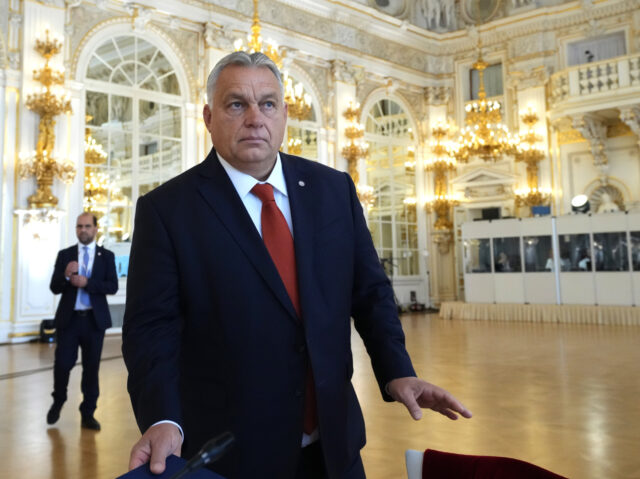Hungary’s Prime Minister Viktor Orbán says “Western refugees” are welcome to abandon their multicultural homelands for Hungary, and that Joe Biden, unlike Trump, is too weak to make peace in Ukraine.
In a wide-ranging interview with the Budapester Zeitung magazine, a transcript of which has been seen by Breitbart Europe, Orbán covered many topics — particularly his recent working visit to Germany and the state of Hungary’s relations with the leftist-led country and the European Union, but also wider geopolitical questions such as the war in Ukraine.
“[T]he United States has a President who is much weaker than his predecessor. Wars can be started by weak statesmen, but it takes strong ones to initiate peace processes and bring wars to an end,” Orbán said, with a frankness that betrays how poor Presiden Biden’s relations are with national conservative-led NATO governments such as those in Hungary and Poland — which he branded “totalitarian” during his 2020 election campaign.
“I… hope that Trump will return and that the U.S. will once again have a strong government,” the Hungarian added, saying that America’s upcoming mid-term elections in November “could open a new chapter for the Republicans.”
Speaking of the consequences of the sanctions war with Russia occasioned by the Ukraine war, Orbán was equally candid, observing that “American and European interests aren’t always identical” and criticising the European Union for “uncritically adopting the U.S. position wholesale, with U.S. interests simply being presented as European interests.”
He seems to have had the drastic reduction in Russian gas supplies to the West particularly in mind, which is leaving many European householders and businesses facing crippling bills but broadly benefits America by making American natural gas, produced in large part by fracking, a more lucrative export — “[t]his is precisely why today Europe is one of the losers in this war and the U.S. is one of the winners,” Orbán suggested.
The Hungarian has been criticised in some quarters for his relatively pragmatic approach towards Europe’s continuing economic relationship with Russia, but told the Budapester Zeitung it should be considered in a broader context: “The cheap energy sources that for decades have supplied Europe are now being progressively transferred to the East and to China,” he said, warning that under the current sanctions regime “the EU in particular has taken steps that will ultimately result in a major boost to cooperation between Russia and China” — which will ultimately prove to be a blow rather than a boon to European interests.
“What the EU is now carrying out is the complete destruction of its rational and geopolitical interests. The decisions on sanctions were taken purely on moral and emotional grounds,” he said, noting that he had sought in vain to discover the “rational core” of Germany’s approach to sanctions, in particular, during his recent working visit there.
Germany, as the European Union’s leading power, came in for particular criticism in the interview, with its leading political party, the leftist Social Democrats (SPD), described as “the most anti-Hungarian party in Europe,” and determined to try and undo or undermine Hungary’s conservative domestic programme.
“German interference in Hungary’s internal affairs – either directly or through EU institutions – has reached extraordinary proportions,” Orbán said.
“In Hungary this creates serious negative reactions. We Hungarians are freedom-loving people, and we don’t like outsiders telling us how to live…. When we were part of the Ottoman Empire, the Ottomans wanted to tell us how to live. Then the Habsburgs came along and told us what they thought a good Catholic was. The Nazis, on the other hand, wanted to tell us who we should live with and who we shouldn’t live with – Jews, for example. Then the Soviets came along and wanted to transform us into ‘Homo Sovieticus’,” recalled the Hungarian, who was himself an anti-communist activist in his youth.
“Time and again outside powers came and tried to tell us how to live. When something like that happens, the Hungarians instinctively resist. Today the German left – through the European Parliament – is once again trying to tell us how to live and what to think about migration, genderism, the nation, the family, and so on. But that’s none of their business. It’s our business,” he insisted.
Orbán tacitly criticised Germany’s own approach to migration, expressing “surprise” at “the large number of armed security guards standing outside synagogues”, for example.
He had positive words for Germans who have been emigrating to Hungary in recent years, however, saying he would not take action to try and limit their impact on house prices or “the ethnic composition of villages” but that, on the contrary, he encouraged Western Europeans dissatisfied with their increasingly multicultural homelands to come to Hungary in greater numbers.
“We’re happy to welcome foreigners who like the way we think,” he explained.
“So can we say ‘Refugees Welcome’?” his interviewer asked.
“Yes, exactly. But from the West! Western Refugees Welcome!” Orbán quipped in response.

COMMENTS
Please let us know if you're having issues with commenting.